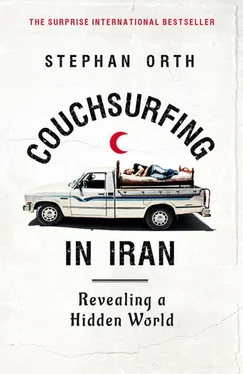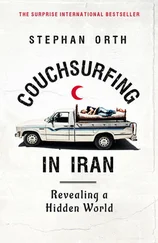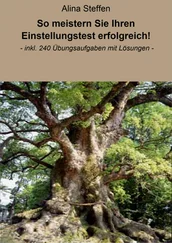The mausoleum of the poet is in a walled compound in the north of the city. Hafiz, whom Goethe considered his twin brother, rests in a pavilion with eight pillars beneath a white marble slab. Today there are many elementary school classes here. Kids in lovely school uniforms lay their hands on the gravestone and recite verses. Laila and I are not the only newlyweds. Hafiz is a kind of patron of lovers, which is why many Iranians make a pilgrimage to Shiraz shortly after marrying. Our conversation is presumably untypical of the usual whisperings of couples.
The dress regulations are getting on Laila’s nerves. “I’ve been wearing the same stuff for five days now, always this red scarf and this dumb, wide frumpy robe.”
“Before we were married you made more of an effort with your outfits.”
“You, too! Need I mention gray hiking pants—every day!”
“Do you love me anyway?”
“No.”
A women is holding a small book and reading out quatrains. The language is like music, and even if you don’t understand the words, it doesn’t detract from the flowing beauty of the sound. Admiration of Hafiz unifies religious and less devout people; they simply interpret his words differently. When Hafiz enthuses about wine and drunkenness, for one it is a metaphor for the intoxicating experience of God, and for the other a homage to forbidden pleasures. The poet was a prominent scholar of the Quran and a man of the world at the same time, so probably both interpretations are not totally wrong. At schools, however, there’s not much Hafiz on the curriculum. “There’s a lot about alcohol and changing the world for his own pleasures,” says Hamed.
I have a translation of some of his works with me and leaf through it.
The ancient world shall turn to youth again,
And other wines from out Spring’s chalice flow;
Wine-red, the judas-tree shall set before
The pure white jessamine a brimming cup,
And wind flowers lift their scarlet chalice up
For the star-pale narcissus to adore.” [3] 3.Ibid., p. 104.
I find a few lines that I have to read out to Laila:
Arise, oh Cup-bearer, rise!
And bring to the lips that are thirsting the bowl they praise,
For it seemed that love was an easy thing,
But my feet have fallen on difficult ways. [4] 4.Ibid., p. 67.
Laila laughs.
How to make small talk for beginners
Irani: Hello, mister!
Answer: Salam! (Smile.)
Irani: Unintelligible sentence containing the word Farsi.
Answer: Man farsi balad nistam. (Apologetically hunch shoulders, palms pointing up.)
Irani: Unintelligible sentence not containing the word Farsi.
Answer: Aleman! (Point at yourself.)
Irani: Aleman! Germany! Very Good! Welcome to Iran!
Answer: Merci! (Smile.)
• • • • • • • • •
IT WOULD BEbeyond my scope to give a detailed account of all the talks and encounters in the city of poetry, yet so many of these keyhole insights into the lives of young Iranians are worth mentioning.
There is the literature student, Golbarg, who wants to write her thesis on gender issues and feminism but doubts whether her themes will be accepted. “There are lecturers who support me, but as soon as there is any attempt even to mention homosexuality, you can forget it. Absolutely impossible in Iran,” she says.
Or Soroush, a good friend of Saeed, a traveler seeking adventure, who contacted me per text messages. He has just returned from a hitchhiking trip to Karbala in Iraq, the holiest city for Shia Muslims. “Everyone there has fifteen mattresses. I was invited to stay everywhere, a new host every night,” he says. He doesn’t seem to be too bothered by what others consider dangerous destinations. His next trip will take him close to the Pakistani border. “I would rather live every day to the fullest than a hundred years of boredom,” he continues. And then, almost in passing, he pinpoints the central problem of my own travels, but also maybe something that makes it interesting. “The best thing about hitchhiking is that you really learn about the people of a particular country. The rich and poor, conservative and modern. With couchsurfing, on the other hand, you are only dealing with one group, who is educated and speaks English, is very modern and enthusiastic about the Internet.”
There is Negar, who also texted me. She is a biologist, likes Jane Austen, and plays the piano, but she would rather be a singer. But nothing will come of that, as her father, afraid of whispering in the family, has forbidden her from performing with her choir. In Iran women are not allowed to sing solo in public, and even in a group it is frowned upon by conservatives. She complains that in Iran education is encouraged but not excellence. Those who are clever often have worse chances in top positions and are intentionally marginalized. “By making it clear that it’s not worth standing out, the government fosters a climate of lethargy, and lethargy is well suited to the maintenance of power.”
Then there is the white-haired man who asks us whether we were enjoying our tour and where we came from, then spouts a few lines from Goethe’s Faust [5] 5.Goethe, Johann Wolfgang von. Goethe’s Faust . Parts I and II. Translated by Louis MacNeice. New York: Oxford University Press, 1952.
in German: “Ahh! Deutsch ! Augenblick, verweile doch, du bist so schön! Blut ist ein besonderer Saft. Auf Wiedersehen !” And he walks around the next corner, leaving behind two very puzzled travelers.
More poetry comes from Ebrahim, a gaunt electrical engineering student who knows a few lines from Paul Celan’s “Death Fugue.” [6] 6.Celan, Paul. “Death Fugue.” 70 Poems . Translated by Michael Hamburger. New York: Persea Books Inc., 2013.
Again two perplexed travelers, this time especially because of his radiant pride during the recital. Ebrahim doesn’t realize that it is all about the Holocaust.
Or Thomas and Mahmut, two physicists from Munich, whose main objective in traveling seems to be related to smoking vast amounts of hashish. They proudly recount how they were arrested near Mosul in Iraq for taking photos of a military base. A couple joints later they send an unusual text message to Laila: It might sound odd, but today we both fell in love with you. We never experienced anything like that before.
Her reply is just the same as any good wife—silence.

HIKING
WE TELL SAEEDof our failed attempt at hitchhiking. On a clammy Friday morning he gives us a free lesson. “It’s important to explain exactly what you are doing. Don’t say that you have no money, but simply say that you always travel like this.”
We are standing on a dusty road out of Shiraz. Saeed stops one car after the other by sticking out his arm horizontally. “When someone flashes the headlights while braking it means they’re a cab,” he explains. “Sometimes I can still convince them to take me for nothing.” After about ten stops with drivers all wanting money, we are finally lucky. We are allowed to get in and drive three miles to the start of our hiking tour of Derak, a nine-thousand-foot mountain just outside the city.
We trudge past hardy shrubs and fragile outcrops and signs showing 6,600 ft, then 7,400 ft, and 7,900 ft. Saeed, with a spring in the heels of his worn-out mountain boots, surges ahead, and we wheeze along behind him. It must be eighty-six degrees Fahrenheit, and there’s almost no shade on the path ahead. Saeed gives us a rundown on his athletic history. As a child he was interested in gymnastics, moved on to boxing, then kickboxing. “But above all else I love hiking in the mountains because it’s not about winning and losing,” says the twenty-year-old.
Читать дальше





![Stephan Orth - Behind Putin's Curtain - Friendships and Misadventures Inside Russia [aka Couchsurfing in Russia]](/books/415210/stephan-orth-behind-putin-s-curtain-friendships-a-thumb.webp)








